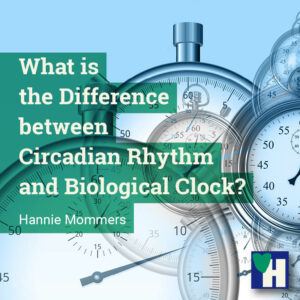
A cow is an animal, but not all animals are cows. Likewise, a biological clock regulates the circadian rhythm, yet not all biological clocks are circadian.
In a nutshell that answers the question “What is the difference between circadian rhythm and biological clock?” There is more to it, which I will explain in this article.
Your circadian rhythm and your biological clock influence how you feel, your general condition, weight, and sleep. And since no one is exactly the same, it is important to know what your circadian rhythm is, how your biological clock and external factors affect it.
Some of the links are affiliate links. As an affiliate associate, we earn a commission when you purchase any of the products offered through the shared links at no extra cost for you. This helps us maintain this website.
Table of contents
What biological clocks do we have?
Every living thing is regulated by biological clocks. Here I am talking exclusively about the biological clocks that control us, humans.
- The circadian rhythms last about 24 hours, like the sleep-wake rhythm (the sun);
- The monthly rhythms last for about 28 to 30 days (the moon), like the female menstrual cycle;
- We know seasonal rhythms and annual rhythms. We feel different in summer than in winter;
- Finally, there are perennial rhythms. Some of your cells are renewed every 7 years.
How about the circadian rhythm?
The circadian rhythm is endogenously controlled and functions largely independent of environmental factors such as light and temperature.
External factors may influence, but first of all your genes determine your optimal circadian rhythm.
The body functions with a circadian rhythm are our temperature, heart rhythm, sleep pattern, the secretion of certain hormones, the volume of the urinary bladder, and our need for food and drink.

It is not a myth that some people function better in the morning and others in the evening. The division is approximately 40% early birds, 30% night owls, and the rest somewhere in between.
Although we can make some adjustments, we can’t change our type entirely. Age also matters. Teenagers have a hard time getting out of bed in the morning for a reason. Their circadian rhythm has shifted to later, while children and older people get up early and go to bed early.
Related: How to Sleep Better and Faster when you’re Aging
What is your type?
We function optimally when we live according to our personal circadian rhythm. External factors, such as fixed office hours or shift work, can negatively influence this.
This not only affects your sleep pattern but also your weight and the way you function.
But how do you find out what your type is?
There are 2 ways to do this: either you live a time without an alarm clock or you go live in a cave without daylight for a few days.
Research into resilience
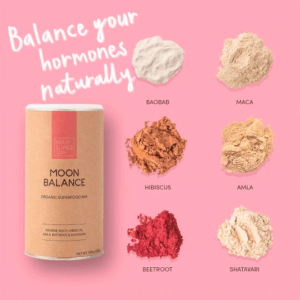
The coronavirus has had a lot of influence on our functioning and our social life. As part of an experiment to test how we can adapt to changing circumstances, 15 French citizens had themselves locked up in a dark cave for 40 days.
They had no clocks or access to social media or telephones. They ate when they were hungry and slept when they were tired.
Once out of the cave, it turned out that a few thought they had been underground for 23 days. Most assumed 30 days.
This showed that the assumption that the circadian rhythm lasts 24 hours is incorrect. This is partly determined by society and by the way we live.
Related: The 4 Best Supplements to Help You Sleep at Night
Optimal functioning within our society
We cannot pretend that a day is 26 or 28 hours. So we have to make the most of the 24-hour rhythm.
I wear an Oura Ring. A gadget that monitors my sleep and movement pattern. Many top athletes use the Oura to determine their optimal time of performance.
When I first got the ring, I tried out different times to go to sleep. I woke up without an alarm when my body saw fit. I have always slept badly and my goal was to find out my ideal sleep and wake time.
Computer data or pen and paper
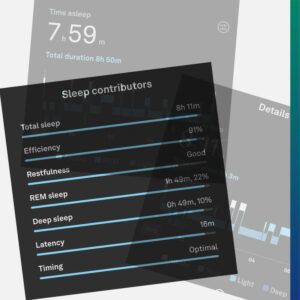
The data of the ring made it easier to discover my patterns, but you can also do that without a ring of course. Keep track of when you go to sleep. Try out a few different times and find out when you wake up on your own. The ideal pattern:
- Fall asleep within about 15 minutes;
- 7-9 hours of sleep without feeling restless;
- 20-25% REM sleep;
- 15-20% Deep Sleep;
- Wake up energized and rested.
Once you’ve discovered your ideal pattern, try to stick to it daily. Also on weekends. Our body thrives with regular patterns. This applies not only to sleep but also to meals.
External factors that interfere with our circadian rhythm
Light
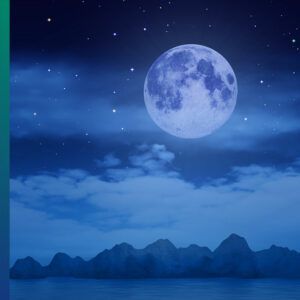
It is good to be in natural (sun)light as much as possible. This can be a challenge in wintertime, depending on where you live. If you suffer from the winter blues or even depression, consider using a special daylight lamp.
When my mother got older and sicker, I bought her a lamp like this. The nurses put them on for half an hour while they were getting her dressed and preparing breakfast.
We usually have too blue and too bright light at night. Current smartphones have a ‘night shift’ setting, which filters the blue light from the screen. It is also advisable not to look at screens some 2 hours before we go to sleep.
Sound
A loud alarm early in the morning suddenly startles you. See if you can set nature sounds or, better yet, try to wake up on time without an alarm clock.
Temperature
The temperature should be comfortable during the day and a little too cold at night. Start your day with a cold shower, then your body warms up faster afterward. You can end the day with a warm shower to let your body cool down.
Your body temperature fluctuates during the day. In the morning it’s usually a bit lower than in the afternoon.
Nutrition
Avoid a heavy meal just before going to sleep. Stop eating in time to allow your body to enter a natural fast. Whether you eat breakfast or not, at least drink one or more glasses of water when you get up.
Exercises
Movement can also have a positive or negative effect on your circadian rhythm. Ideally, you walk and stand more during the day and you sit mainly in the evening. (Silly, don’t you think, to let our kids sit still in school all day).
Social interactions
Meeting people is important, we noticed this recently. People are social beings. But if our friends have a later circadian rhythm than we, it can interfere with our bedtime. The so-called social jet lag.
We can either meet them earlier or try to be strong and leave earlier. I wasn’t surprised to read in the newspaper the other day that Spanish people sleep fewer hours than the Dutch or the Belgians. They are notorious for going to bed really late although their office hours are in sync with the rest of Europe.
Stress
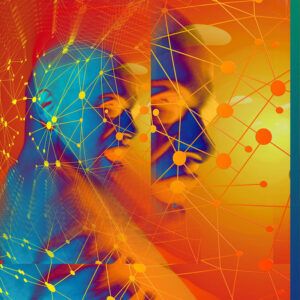
Stress is one of the worst ailments of our time. We are too busy, we act too busy. It won’t be long before stress is the #1 killer.
Office hours and school schedules
Night owls will have a hard time getting to the office in time. Early birds will have their midday dip early in the afternoon, night owls will have it 2 to 3 hours later.
Time zones and night shifts
Different time zones are a major disruption to our circadian rhythm when flying from east to west or vice versa. And that also applies to shift work.
Having to go to work at different times and changing sleep patterns not only have a bad effect on the quality of our sleep but are also considered to be a cause of dementia.
What is the difference between circadian rhythm and biological clock?
Our biological clock plays a huge part in our circadian rhythm as an internal factor. Yet, external factors can have a positive or negative effect on this rhythm. Establish your ideal circadian rhythm and fold your life around it as much as you can.
Are you an early bird or a night owl? Tell us in the comment box below.

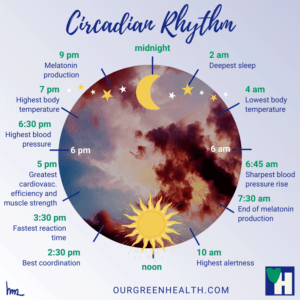
This was super interesting. I had never heard of our circadian rythm before, now it all makes so much more sense to me. I get up with the sunrise and sometimes a little before sunrise, I don’t use an alarm clock, so I found it interesting to read your recommendation about not using one to see your own rythm. I have not used an alarm clock in 2 or 3 years now (and I love it!)
I have lots of energy in the morning, but I lose energy around noon and early afternoon – I also live in the semi desert and during summer times noon is extremely hot – and in the evening I get energetic again and I can keep on working.
So, am I both, an early worm and a nigh owl? I write books and I do my best writing in the morning, but I’ve also written a lot on late evenings, sometimes until 1 or 2 am. I looked at the image of the circadian rythm and noticed that we have our greatest cardiovascular activity and muscle strenght at 5 pm. So, does that mean that it’s best to do exercise, or activities, or heavy work around that time?
You and me both, Christine. I too quit using the alarm clock a couple of years ago. Before that, I got up at 5 every morning. Just because some gurus said that successful people get up early. Nowadays, I’d rather feel relaxed and get more done anyway.
Night owls and early birds are the extremes. It’s not that the whole world’s population is either one or the other. A part is, and the rest of us are in between. Like you. 🙂
In the hot summer months here in Spain, I do a siesta as well. It’s common sense not to strain ourselves in the heat, don’t you think? Back in the Netherlands, it would have been nonsense.
Yes, some say it is best to exercise at the end of the afternoon. Personally, I think that whenever we try to make general recommendations, these apply to a part of humankind. The norm is always an average and not everyone is the same. I would suggest you do the heavy work for a couple of weeks around that time and for a couple of weeks at a different time. See when you feel the best.
Thanks for your comment, Christine, and stay healthy.
What a great article! English is not my first language, so it’s the first time I hear about the circadian rhythm. I have never heard that word even in my language, French. At first, I had trouble to understand that our circadian rhythm is determined by our biological rhythm and external factors. But your post is so well written that I finally got it. (at least, I hope). :0)
By the way, I’m a jazz pianist. So I’m a night owl.
LOL, as a musician you probably thought I was going to talk about a totally different rhythm, didn’t you 🙂
In French, it is rythme circadien, not that different from circadian rhythm. So it’s probably not the language, just the unfamiliar meaning. I am glad my explanation was helpful for you. I had never heard of the circadian rhythm either until a few years back. It’s just not such a well-known concept.
Are you a night owl and thus it’s convenient for your performances? Or do you have to be a night owl because of your performances? Because in that latter case, keep an eye on the signals of your body. If you are going against your true nature you could be in trouble later on.
Not that I want to scare you. It’s just something to be careful with.
Thanks for your reaction and take care.
Hi Hannie, I know that the circadian rhythm can be poorly interrupted, and we modern people have for certain disrupted circadian rhythm.
I worked nights for ages, and even though I preferred to work nights, it left me still interrupted and awoke nearly all night my time off.
The way we are forced to get up early in the morning, drinking a coffee to fit our jobs, is not correct.
However, the circadian rhythm depends on the area we live in, closer to the poles or Equator. Natural people go to sleep with the moon and get up with the sun, same as the animals. Our modern artificial world is not suitable for humans and animals, lights on all night. The noise and light pollution don’t help us to relax, so stress is a constant factor. Natives are living in other continents where all women menstruate at the same time. Can you imagine? This shows that if we are aligned with nature, we would completely function differently. But smartphones, television, and computers are not very beneficial for our inner clock, so does our interpretation of working a job.
That is why there are movements where people ground themselves, even in their houses, and do sungazing early in the morning so that the circadian rhythm is reset. It is a fascinating topic. 🙂
Circadian rhythm sure is a fascinating topic, Sylvia. I sometimes sleep badly, so I started a month ago to note what phase the moon had in relation to my sleep. So far I haven’t discovered a pattern yet, but a month is short, isn’t it?
It’s not just the native women that menstruate at the same time. There are a lot of examples of communes and groups of friends living in the same house who developed the same pattern. 🙂
Thanks for your reaction and stay healthy.
My sleep is a mess right now. Before the pandemic began I slept so much better and not only that, I had a routine in place. Now I barely get to sleep 5 hours and I feel tired all the time… I used to be an early bird but now I think I’m more of a constantly exhausted pigeon haha.
Oh, Abigail, I am so sorry to hear that. Is it the stress or the noting-to-do that causes your sleep problem? I do hope you find a way to get more sleep because 5 hours a night really is not enough. I know there are people who say they thrive on 5 hours only but those are the ones that have a big percentage of those 5 hours in deep sleep. They are the exception.
It looks like your lack of routine is also part of the problem? If so, you know the solution, of course. Make sure you get back into a routine again. It probably can’t be the same routine but there is always a way to find something new that is helpful.
Thanks for your reaction and take good care of yourself!